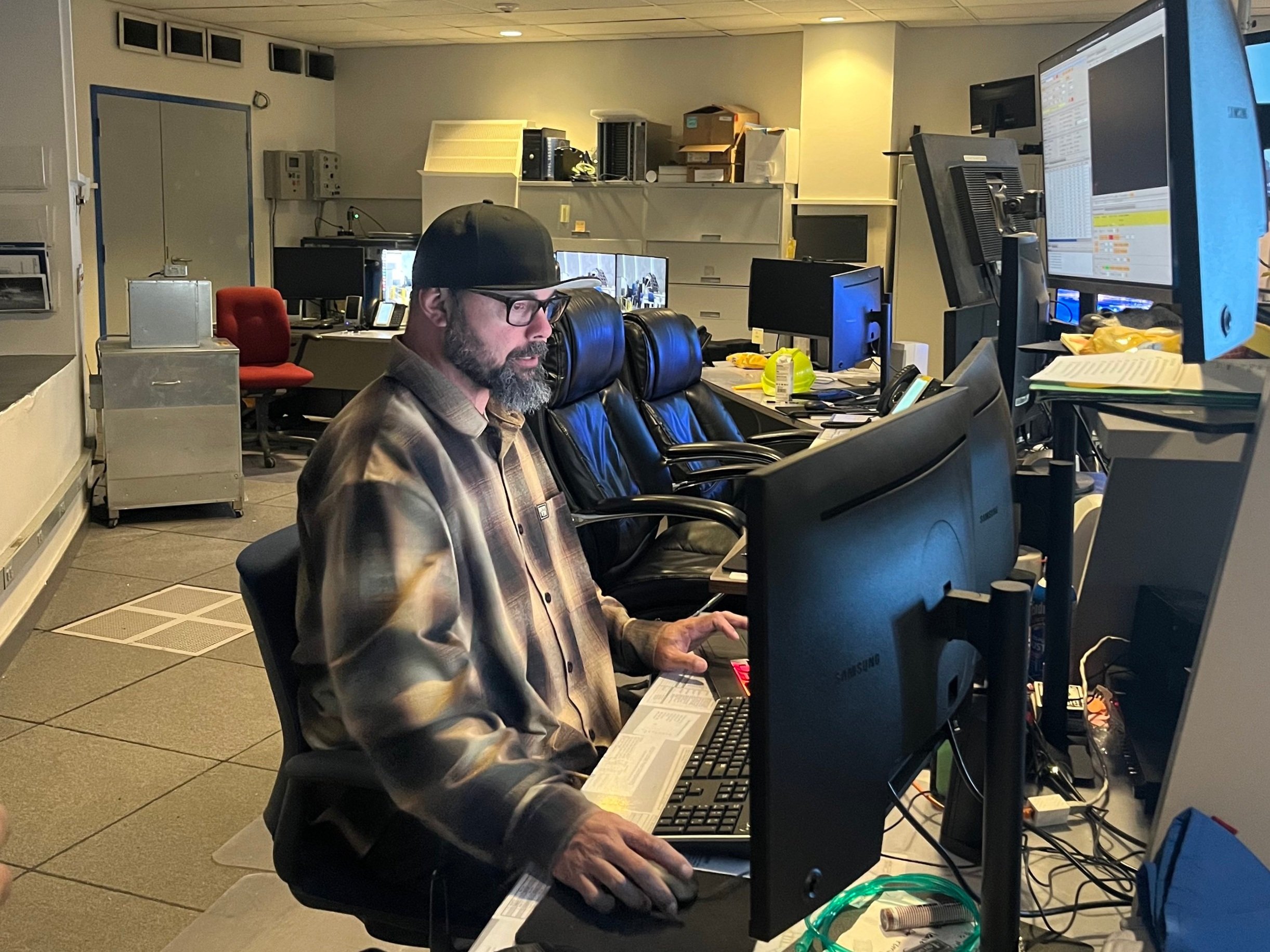What Does It Take To Become A Telescope Operator?
Derek Petrowski, right with photographer Cory Lum on site at Keck. Photo credit: Diana Hahn
As a child, Derek Petrowski was the kind of kid who would insist on taking the toys he received for Christmas apart. He loved to disassemble, investigate, and rebuild anything and everything he could get his hands on – a curiosity that would set him on a path to becoming a Telescope Operator and Support Technician at W. M. Keck Observatory.
“I’ve always had a curious mind and been a techy person,” says Derek. From cars to motorcycles to computers, Derek’s ability to make sense of mechanical mysteries has instilled a proactive and ambitious attitude in him: “I see things and I get intrigued, and think, ‘I can do that.’”
Today, Derek is responsible for overseeing the operations and maintenance of Keck Observatory’s twin telescopes atop Maunakea, ensuring they are ready each night for observations. “My position is like a hub – I interact with everybody, from software engineers to mechanical engineers to infrastructure staff. I am always in touch with the observers so I can switch instruments and do calibrations.”
Derek’s trajectory to the telescopes
Although Derek’s childhood curiosity prepared him for his career, he never expected to work on telescopes. “I always wondered what they did up there. It’s a common misconception that working in astronomy is mysterious. I always assumed that in order to work at the telescopes, you needed a lab coat and goggles.”
Derek was born in Fiji and grew up on the US continent and in Egypt, later moving to Hawaiʻi Island in the 1990s. Derek struggled in school and often felt unchallenged by his classes, and sometimes felt like he lacked direction in his early adulthood. He began working in the construction industry and continued to pursue more technical roles over the next 20 years, including at a bioenergy facility in Hilo.
Along the way, Derek met his wife. They settled down in Waimea and raised six children together. Their youngest is now 16 years old, and their oldest is 32. “I’ve lived here in Waimea right behind Keck headquarters for 22 years, and I never did think of applying for a job here.”
Photo Credit: Diana Hahn
“Anybody could work up here, you just need to put your mind to it. There are jobs in Hawaiʻi, including in astronomy, that can help us afford to stay here, live comfortably, and support our families.”
After Derek’s wife began working at the Canada-France-Hawaiʻi Telescope as an accountant a few years ago, Derek realized the skills he had learned in construction were highly transferable to working on telescopes and observational instruments. When an opportunity arose to apply for an open role at Keck Observatory, Derek took his chance. Two months later, he began his new role on the mauna.
A day in the life of a telescope operator
As a telescope operator and support technician, Derek works four days a week on Maunakea. Each day, he and his team prepare the telescopes for that night’s observations. “We’re like the pit crew,” says Derek. “We look at what needs to be used by the observers and reconfigure the telescopes in the day in preparation for their use at night.”
When new astronomical discoveries are made, Derek feels proud of the fact that he installed the instruments that were used. He emphasizes that there are many folks in addition to the observers who make such scientific discoveries possible. “People from the trades are working up here and keeping this whole thing moving,” says Derek. “But you rarely hear about the people who make things tick.”
“In one or two generations, there could be enough local kids who could be filling many of the positions at the Maunakea Observatories. Maybe other countries would be calling us in Hawaiʻi for the best talent in astronomy. We need more variety in career paths for young people.”
Photo credit: Cory Lum
In addition to working atop Maunakea, Derek is frequently involved in Keck Observatory community engagement activities. He volunteers with the monthly Waimea Family Food Truck Friday event held at the Observatory’s Waimea campus, and helps with community events like the Waimea Christmas Twilight Parade and the Waimea Paniolo Parade. Being active in the community in this way is important for Derek; not only is it a way of giving back, but it’s also an opportunity for him to show that working at an observatory is an accessible career path for others.
Opportunities for future generations
As a father, Derek stresses how vital it is for local students to pursue post-secondary education and job opportunities in Hawaiʻi. “Anybody could work up here, you just need to put your mind to it. There are jobs in Hawaiʻi, including in astronomy, that can help us afford to stay here, live comfortably, and support our families.”
Derek envisions a future where more kamaʻāina are encouraged to enter STEM (Science Technology Engineering and Mathematics) fields with the support of their parents, educators, career pathway programs, and internship opportunities. “In one or two generations, there could be enough local kids who could be filling many of the positions at the Maunakea Observatories. Maybe other countries would be calling us in Hawaiʻi for the best talent in astronomy. We need more variety in career paths for young people.”



